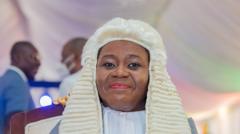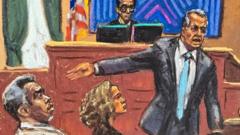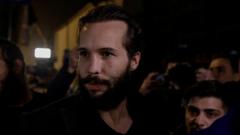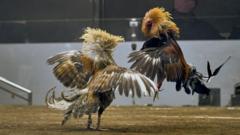The suspension of Chief Justice Gertrude Torkornoo in Ghana has incited strong condemnation from opposition politicians, who accuse President John Mahama of exerting undue influence over the judiciary. Proponents of the decision argue it is necessary for judicial reform, while critics deem it a serious violation of due process and judicial integrity.
Opposition Decries Suspension of Ghana's Chief Justice as Executive Overreach

Opposition Decries Suspension of Ghana's Chief Justice as Executive Overreach
Ghana's Chief Justice Gertrude Torkornoo has been suspended, sparking fierce criticism from opposition lawmakers who claim it undermines judicial independence.
In Ghana, the recent suspension of Chief Justice Gertrude Torkornoo has ignited significant controversy, with opposition members of parliament labeling the move an "abuse of power" by President John Mahama. The suspension marks a historic occurrence; it is the first time a chief justice has been removed from office in the nation’s history.
On Wednesday, President Mahama suspended Torkornoo in light of three yet-to-be-disclosed petitions alleging misconduct against her. Although the president's supporters justify the decision as part of a necessary effort to reform the judiciary, critics have labeled it a "brazen judicial coup" and an egregious attack on judicial independence.
Mahama's administration claims that Torkornoo is being temporarily removed to ensure a fair investigation into the allegations, a move that has stirred controversy regarding adherence to legal procedures. Legal experts have noted that the president should have provided copies of the petitions directly to Torkornoo before the suspension, an action he initially neglected.
As the situation unfolds, former attorney general Godfred Yeboah Dame described the suspension as "the biggest assault on the judiciary" in Ghana's history. Meanwhile, the opposition has asserted that the executive's actions violate due process by acting prematurely before the Supreme Court weighed in on pending lawsuits regarding the legality of the suspension procedure.
Conversely, some members of the public have expressed support for the president. Dr. Tony Aidoo, a former diplomat, argued that the action serves to protect the integrity of the judiciary. He contended that removing Torkornoo is essential in ensuring the judiciary does not support any biases from her tenure.
The contentious backdrop includes a history where Torkornoo, who is also the third female chief justice in Ghana, was previously defended by former President Nana Akufo-Addo against removal attempts earlier in the year. The Supreme Court's perception under Torkornoo has been critiqued, particularly when it sided with Akufo-Addo's government in contentious legislative matters.
To address the allegations against Torkornoo, a five-member committee is set to investigate the situation moving forward. The unfolding events will likely influence the perception of judicial independence in Ghana, a concern for many observers as Ghana navigates through its political landscape and the implications for its governance structure.






















